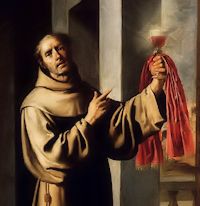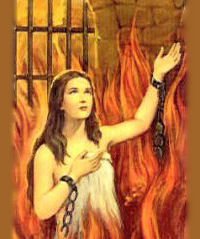Advent: November 28th
Monday of the First Week of Advent
Other Commemorations: St. James of the Marches, Priest (RM)
» Enjoy our Liturgical Seasons series of e-books!
"That day, the branch of the Lord shall be beauty and glory, and the fruit of the earth shall be the pride and adornment of Israel's survivors (Isaiah 4:2)."
God might have created Adam and Eve into a purely natural order in which their reward in afterlife, and ours too, would be eternal happiness in such perfect knowledge and love of Himself, as is required and sufficient to satisfy to the full, every claim and craving of human reason and will. Yet, that natural perfection and happiness in eternity would be immeasurably lower than the supernatural reward God actually designed for the parents of our race and for all their children.
The excellence of Adam and Eve's natural endowments.
 It is a deplorable error to extol as supernatural, perfections and powers that are entirely natural for us, even essential or integral to every human being. This includes our reason which is essential to our human nature, that without it no being can be really human. So also our spiritual will, with its power of loving things immaterial and purely spiritual, and its desire for the infinite and eternal, even with a longing that cannot find its perfect satisfaction except in the knowledge and love of Him who is for us our first Beginning and our last End. All this is so entirely natural for man, that a human soul is inconceivable without such spirituality and immortality.
It is a deplorable error to extol as supernatural, perfections and powers that are entirely natural for us, even essential or integral to every human being. This includes our reason which is essential to our human nature, that without it no being can be really human. So also our spiritual will, with its power of loving things immaterial and purely spiritual, and its desire for the infinite and eternal, even with a longing that cannot find its perfect satisfaction except in the knowledge and love of Him who is for us our first Beginning and our last End. All this is so entirely natural for man, that a human soul is inconceivable without such spirituality and immortality.
The preciousness of Adam and Eve's preternatural gifts.
God not only gave Adam and Eve dominion over the whole world, but He actually brought human nature in them to an extraordinary degree of perfection, such as would assure both to themselves and to their offspring, for all the time of their life in paradise, freedom from every fear of sickness and death, and from all sorrow and all worrying care and every annoying disorder. And without passing through the gateway of death, they would in God's own time be assumed by Him into their eternal home, the true paradise of their destiny.
The wonders of Adam and Eve's supernatural destiny and state.
God created our first parents into an inexpressibly high and strictly supernatural and divine, order. He created them for the final perfection and eternal happiness of living in close association with Himself as His very children, in the face-to-face vision of Himself as He is in Himself, and in a most intimate communing with Him and a filial sharing in the wealth and sweetness of the bliss of the Most Holy Trinity. In the first moment of their existence, by the infusion of His sanctifying grace, God adopted them as His very children.
Things to Do:
- Don't forget to pray "Hail and Blessed be the hour...", the Christmas Anticipatory Prayer every day until Christmas.
- St. Nicholas Day is coming soon. Take time today to plan some activities, foods and little surprises for the shoes or stockings left out on St. Nicholas Eve (December 5). See the activities and recipes on St. Nicholas Day for ideas.
- Think of others who aren't as privileged who will be suffering from loneliness, depression, sickness, povery, etc. during these Advent and Christmas seasons. Make sure your Advent preparations includes some Corporal Works of Mercy for others. Perhaps makes an extra batch of St. Nicholas cookies and distribute them to the homeless or the nursing home.
St. James of the Marches
 The small town of Montebrandone, on the eastern coast of Italy, called the March of Ancona, gave birth to this Saint in the year 1391. While still young he was sent to the University of Perugia, where his progress in learning soon qualified him to be chosen preceptor to the children of a young gentleman of Perugia. He went with him to Florence, to aid in the administration of a juridical office the nobleman had obtained there; but realizing that he was about to be engulfed in the whirlpool of worldly excesses in which he found himself, Saint James applied himself to prayer and recollection, and thought of entering the Carthusian Order.
The small town of Montebrandone, on the eastern coast of Italy, called the March of Ancona, gave birth to this Saint in the year 1391. While still young he was sent to the University of Perugia, where his progress in learning soon qualified him to be chosen preceptor to the children of a young gentleman of Perugia. He went with him to Florence, to aid in the administration of a juridical office the nobleman had obtained there; but realizing that he was about to be engulfed in the whirlpool of worldly excesses in which he found himself, Saint James applied himself to prayer and recollection, and thought of entering the Carthusian Order.
When traveling one day near Assisi, however, he went into the Church of the Portiuncula to pray, and moved by the fervor of the holy men who there served God and by the example of their blessed founder Saint Francis, he determined to petition in that very place for the habit of the Order. He was then twenty-one years of age; he received the habit near Assisi, at the convent of Our Lady of the Angels. He began his spiritual war against the world, the flesh and the devil in prayer and silence in his cell, joining extraordinary fasts and vigils to his assiduous prayer. He fell ill with a number of different illnesses which for thirty years he endured with heroic patience, without ever exempting himself from saying Holy Mass or assisting at the offices in common. For forty years he never passed a day without taking the discipline.
When, through the response of the Mother of Heaven to his prayers, he became able to preach, he carried out that ministry with such great fervor and power that he never failed to touch the most hardened hearts and produce truly miraculous conversions. He joined Saint John of Capistrano to preach a crusade against the Turks, who had become masters of Constantinople and were terrorizing Western Europe. At Buda he effected the miraculous cessation of a furious sedition by simply showing the crucifix to the people; the rebels themselves took him upon their shoulders and carried him through the streets of the city. At Prague he brought back to God many who had fallen into error, and when a magician wanted to dispute with him, he rendered him mute and thus obliged him to retire in confusion. He traveled through the northern Provinces, into Germany, Dalmatia, Hungary, Poland, Norway and Denmark and many other places; he went without any provisions other than his confidence in God. If he found no aid or was without lodging he rejoiced in his union with Lady Poverty, to whom he was joined by his religious profession.
When he was called back to Italy to labor against a heresy, he acquired new persecutors who attempted in several ways, including ambushes, poison, calumny and the arousing of seditions against him, to do away with him. But God delivered him each time from the most adroitly conceived artifices. When chosen as Archbishop of Milan, he fled, and could not be prevailed on to accept the office. He brought about several miracles at Venice and at other places, often by the simple Holy Name of Jesus written on a paper. He raised from dangerous illness the Duke of Calabria and the King of Naples. The Saint died in the Franciscan convent of the Holy Trinity near Naples, to which city the Holy Father had sent him at the prayer of its King, Ferdinand. The date was the 28th of November of the year 1476; he was ninety years old, and had spent seventy of those years in religion.
—Excerpted from Les Petits Bollandistes: Vies des Saints, by Msgr. Paul Guérin (Bloud et Barral: Paris, 1882), Vol. 13; Little Pictorial Lives of the Saints, a compilation based on Butler's Lives of the Saints and other sources by John Gilmary Shea (Benziger Brothers: New York, 1894).
Patronage: Monteprandone, Italy; Naples, Italy
Symbols and Representation: priest holding in his right hand a chalice from which a snake is escaping; chalice and serpent; Franciscan holding a chalice and a veil; Franciscan with a staff, castanets at his girdle, pointing to IHS (from CatholicSaints.info)
Highlights and Things To Do:
- St. James is considered one of the "fathers of the modern pawnshop!...To combat extremely high interest rates, James established montes pietatis—literally, mountains of charity—nonprofit credit." organizations that lent money on pawned objects at very low rates. (from Franciscan Media).
- Read more about St. James:
- St. James lived a very austere life. He was a skinny man who dressed in a tattered habit. He fasted every day until his health began to fail. The pope ordered him to eat as a public service, and St. Bernardine of Siena told him to moderate his penances. We can't think to possibly take up the same practices, but his approach in loving God and giving of his whole self is an inspiring example.
- The Order of Friars Minor are known as the "Observants," usually called Franciscan friars. Their official name: "Friars Minor" with the abbreviation OFM. The Franciscan saints John of Capistrano, Albert of Sarteano, and Bernardine of Siena, and James Marche are considered the “four pillars” of the Friars Minor. All four of these saints were well-known for their preaching.
- St. James Marche's body is incorrupt, and has been preserved in Santa Maria La Nova in Naples until 2001. They were transferred in 2001 to Santuario Santa Maria delle Grazie e San Giacomo della Marca (Church of Our Lady of Grace and St. James of the Marches.








